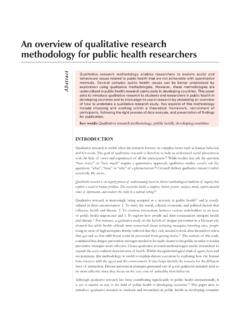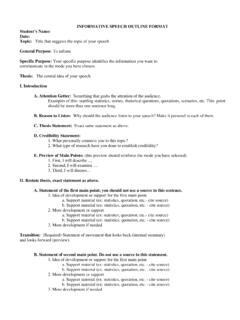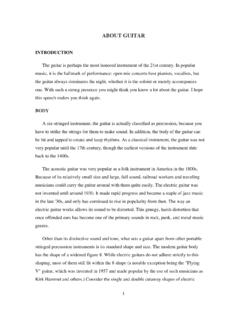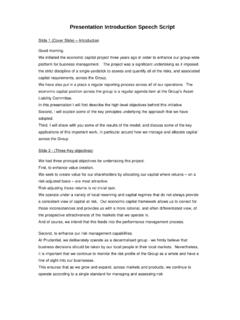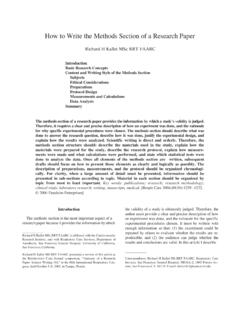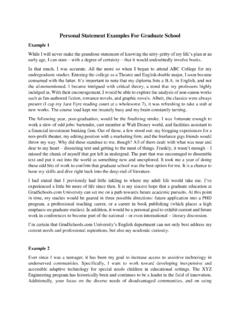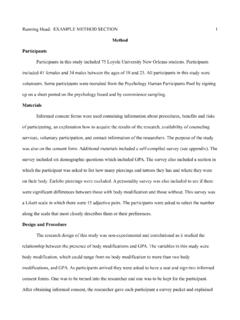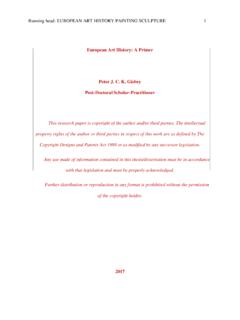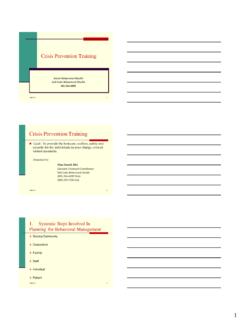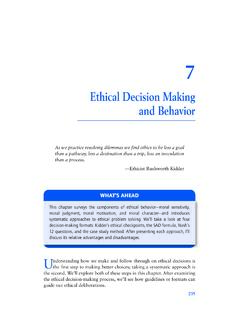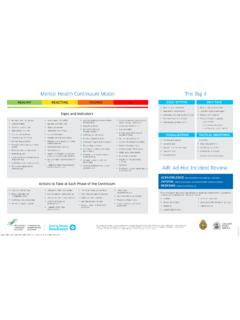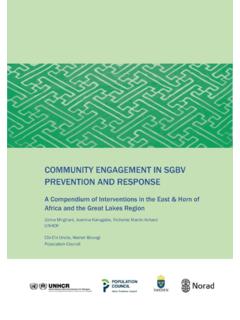Transcription of A Perfect Nursing Reflective Essay | PDF Sample
1 1 EXAMPLE Reflective Essay FOR Critical Thinking and Writing for Nursing Students Bob Price and Anne Harrington This example of a Reflective Essay is presented in association with Price, B and Harrington, A (2013) Critical Thinking and Writing for Nursing Students, London, Learning Matters. Readers are introduced to the process of critical and Reflective thinking and the translation of these into coursework that will help them to achieve better grades in Nursing courses. Stewart, Raymet, Fatima and Gina are four students who share their learning journey throughout the chapters of the book. In this Essay on the assessment of pain, Raymet demonstrates her Reflective writing skills near the end of her course. Raymet had by this stage written several Reflective practice essays and gained good marks.
2 This time though she was encouraged to deepen her reflections, speculating selectively on how the account of pain experienced by a patient (Mrs Drew) might help her to work more creatively with patient perceptions and reported needs. Remember, copying essays such as this, submitting them as a whole or in part for assessment purposes, without attributing the source of the material, may leave you open to the charge of plagiarism. Significant sanctions may follow for nurses who do this, including referral to the Nursing and Midwifery Council. Assessing Mrs Drew s Pain Mc Caffery and Pasero (1999) state that pain is what the patient says it is. If we accept that point, then nurses need to explore the patient s perceptions of pain, as well as their report of experiences.
3 The two are not quite the same. Patients may report their pain in a variety of ways, dependent on the nature and the intensity of pain and the context in which it is felt ( whether they are ever distracted from the pain). Their perception of pain is a little more though and it includes the meaning that the pain has for them. It includes explanation of why the pain is there in the first place, what it indicates about their body and what it could suggest might happen in the future (getting better, getting worse). The nurse assesses the account of pain shared by the patient, and this may be given in the form of a story. This is how it began, this is how it felt, this is what that meant to me and this is what I did about it (Mishler et al.)
4 2006) In this Essay I explore the assessment of pain as conducted with one 60 year old patient whom I will call Mrs Drew. Whilst the Essay describes an assessment of pain with a single patient, I try to share too some ideas and questions that this provokes within me about pain assessment more generally. Mrs Drew made me think about other patients, future assessments and what I had to do as a nurse to help patients. To help structure this Essay I use the framework described by Gibbs (1988). Whilst the episode concerned relates a stage in Mrs Drew s illness when she challenged her treatment protocol, it also includes some of the memories and thoughts that this patient refers to regarding her earlier illness and past ways of coping with pain.
5 In particular, it prompted me to question to what extent I as a nurse should recommend analgesia, drawing on what I had been taught about the Nursing Reflective Essay 2 effective control of pain. I had learned that it was better to control rather than to chase pain ( Mann and Carr, 2006; Forbes, 2007). Mrs Drew was diagnosed with lung cancer a year earlier and had initially had her illness treated by chemotherapy. This had helped her to achieve a remission that lasted for nearly ten months (Hunt et al, 2009 describe the prognosis of this disease). The cancer had returned though and spread to her spine and it was here that she experienced most of her pain. It was at this stage that the doctors explained that her care would now be directed towards her comfort rather than a cure to which she had replied, you mean palliative care.
6 Mrs Drew was supported at home by her husband Neil and visited on a regular basis by community based nurses to whom I was attached as part of my student nurse training. She was prescribed oral morphine and could decide within stated limits how many tablets she could take in any one 24 hour period. The situation I had visited Mrs Drew on several occasions over the period of a month when the community nurse and I were confronted by a tearful patient who announced that she did not wish to take the oral opiates quite as often as we were recommending. As she spoke she held her husband s hand tightly, looking across to him as she described her experiences and feelings about the matter. Yes, there had been some bad nights when the pain had woken her and she had to sit up and watch television to try and distract herself.
7 Yes, sometimes the pain made her feel nauseous, but she was alarmed at how frequently she was taking the pain tablets and how this made her feel about herself. However well meant the medication was, it didn t feel dignified to be so reliant on drugs, or quite so sleepy and unresponsive for such a high percentage of the day. Whilst the analgesia was working well when she took the tablets, the quality of life wasn t what she wanted. The community nurse listened patiently to Mrs Drew and then explained that it was normal to have panic moments about such medication. Morphine had a reputation, one that people associated with misuse of drugs, rather than their therapeutic use. Used on a regular basis, the drug wouldn t cause addiction and it would provide a great deal of reassurance to Mr Drew as well.
8 The community nurse stated that she was quite sure that he respected his wife s need to sleep when she wished and to build the rhythm of the day around her needs. At this point Mrs Drew shook her husband s hand, and said, tell her what we ve talked about! Mr Drew then explained that his wife was used to dealing with pain, she had suffered recurrent pain in her neck and shoulder after a road traffic accident some years before. The pain had sometimes been severe, but he had massaged her shoulders and used heat packs that she found soothing. They had decided that they wished to use this technique now, keeping the morphine for absolute emergencies, when she was losing sleep and couldn t eat as a result of the discomfort. The community nurse assured them that they were in charge of the analgesia and would be allowed to make their own decisions.
9 She started to make notes though, and announced that she was making a referral to the cancer pain clinic, something that would help them to take stock of the situation. There was very good reason to suppose that this might be a problem associated with choosing the right dosage of the morphine, rather than using supplemental pain relief measures. Mrs Drew responded sharply, You re not listening to me though Jane (the community nurse s name a pseudonym is used here), I want to use heat packs instead of morphine, at least during the 3 day. I want to be more alive with my husband. The community nurse assured Mrs Drew that she had heard what she had said and respected her point of view. There would though be nothing lost by using the clinic to gain a further check on this matter.
10 With that she excused us, explaining that we had a further appointment that morning and we left, having checked that Mrs Drew had a sufficient supply of her different medicines. As we walked to the car the community nurse empathised with Mrs Drew s plight, saying that if she had lung cancer she would probably grasp at straws too. She would reach out for things that seemed more normal, and then observed, but this isn t normal is it, the pain she has isn t normal. It s not just a whip lash injury and old age. Feelings I remember that during this episode feeling a mixture of confusion, surprise, anger and impotence. Mrs Drew had surprised me by the way she had spoken, using what seemed to be a planned announcement. They had waited for and perhaps rehearsed this moment.
